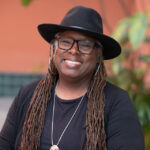In 1851, at the Women’s Rights Convention in Akron, Ohio, Sojourner Truth stood before a crowd of white women and asked, “Ain’t I a woman?” And they laughed.
In 1979, at the Second Sex Conference, Audre Lorde was invited only after organizers were called out for excluding women of color. She delivered a searing critique titled “The Master’s Tools Will Never Dismantle the Master’s House,” reminding white feminists that difference is essential to survival, not division—and that:
Neither woman was handed a mic. They claimed it.
And in 2024, I claimed mine. I was one of the 92% of Black women who showed up—again—to save democracy. While we voted for a multiracial future, 53% of white women voted for Donald Trump. Again.
White feminism has never been about full liberation—it’s always been about protecting whiteness. Black women? We’ve been here—not to join, but to confront.
In 1866, Frances Ellen Watkins Harper stood before the American Equal Rights Association and declared:
“You white women speak here of rights. I speak of wrongs.”
While hailed as pioneers, Susan B. Anthony and Elizabeth Cady Stanton used racist arguments during the Fifteenth Amendment debates. They opposed Black men’s right to vote, claiming white women—especially educated ones—deserved it first. Stanton even questioned elevating “Patrick and Sambo and Hans and Yung Tung” over educated white women. Their racism wasn’t a footnote—it was strategy.
Ida B. Wells refused to be pushed to the back of the 1913 suffrage parade. When told to march separately, she joined the Illinois delegation—on her own terms.
Mary Church Terrell declared:
“A white woman has only one handicap—sex. I have two—race and sex.”
She and others lived intersectionality before there was a word for it.
That word came in 1989 when Kimberlé Crenshaw coined intersectionality to describe how race, gender, and class compound oppression—especially for Black women. It’s not a buzzword. It’s a framework for survival.
Feminism without intersectionality is white supremacy.
And white supremacy is the foundation fascism builds on.
Take Moms for Liberty: a group of mostly white women pushing book bans and anti-Black narratives under the guise of “protecting children.” These aren’t fringe players. They are white womanhood defending white power.
White women’s tears have never been neutral.
From Carolyn Bryant’s lie that sparked the lynching of Emmett Till to Amy Cooper’s staged panic in Central Park, white tears have long triggered violence, control, and erasure.
We carry the toll in our bodies.
That’s Black Fatigue, named by Mary Frances Winters—the psychological, emotional, and physical exhaustion that comes from surviving systemic racism while propping up a country that betrays us.
But even that’s being weaponized. When we speak out, they call it burnout. When we say enough, they call it fatigue. They pathologize our endurance instead of addressing the system.
Dr. Arline Geronimus calls it weathering: a theory backed by decades of research showing how chronic stress from racism accelerates aging and leads to deadly health outcomes. NPR confirms: it literally wears down our arteries, immune systems, and hearts. We also now know that intergenerational trauma is real and biological.
We’re not tired because we’re weak. We’re tired because this country has been killing us softly—and calling it democracy.
Audre Lourde said “Caring for myself is not self-indulgence, it is self-preservation, and that is an act of political warfare.”
To our so-called allies: Now it’s your turn.
Use your privilege. Use your platform. Use your whiteness for good.
We’ve always shown up—for democracy, for justice, for a country that still doesn’t fully see us. But now?
We saw what you did in 2016. We saw it again in 2020. And in 2024, we saw it clearer than ever.
Don’t get caught up in your feelings if we sit this next one out.
We’re standing by to see what you are going to do in 2026.
Because we’re tired of being Charlie Brown, while you Lucy us—pulling the football away every time we trust.
We did our part. If liberation matters—act. If not—step aside.
Where Do We Go From Here?
To the white women who showed up at No Kings Day protests all over the country—we saw you.
But we also saw how you voted in 2016.
And in 2020.
And again in 2024.
So now what?
To the white women who call yourselves allies—who claim feminism, equity, and justice:
We want the same energy that had you marching in the streets after Roe, or holding signs in 2020, to show up at the polls. Not just once. Not just when it’s trending. Every. Single. Election.
And vote like your liberation is tied to ours.
Because it is.
Vote like trans lives matter. Like undocumented people matter. Like Black mothers matter. Like poor kids matter. Like freedom is collective—or it isn’t freedom at all.
Don’t perform solidarity online if you won’t show up when it counts.
Don’t quote Audre Lorde if you’re not ready to follow her lead.
Because this time? We’re not carrying you.
We’re watching.
And that football? It’s staying on the ground.
Because feminism without intersectionality is white supremacy.
And white supremacy builds fascism.
Let those most impacted lead.
Fund their work.
Help rebuild what your silence allowed to be broken.
Not for credit. Not for clout. But to make things right.
Because anything less… isn’t liberation.
